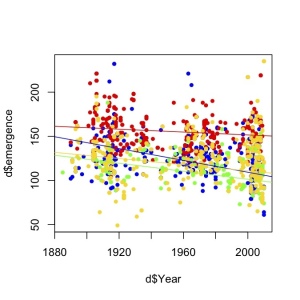I have several posts I would like to do, but this month has been very hectic. This encouraged me to revise how I deal with my tendency to overcommit myself with new projects, while managing to accomplish deadlines and still not working on the weekends. The result is that I am posting this instead of other alternative posts. See why.
1) Externalize fun work for out of the office. When I arrive home I play with my daughter so there is no way I can do actual computer work there. However most of my work involves thinking. I can think in many places. My favourites are on my bike on the way to work or when running. I not only think about work then, I also wonder about other stuff or picture myself in a tour de france time trial. However, I find that some fun problems are better solved in that context. Why? Because if you don’t come up with an idea in 5 minutes while sitting in front of your computer you feel desolated, but is ok to not have ideas if you are already doing something (e.g. running). Also, because if you are on your computer you tend to try (and put hands on) the first thing your intuition tells you will work. This way is easy to get lost in the details or do overcomplicated things that won’t work at the end. However, while running, you are forced to develop all the steps necessary and abstractly think if they will work discarding bad ideas way faster. Plus, blod is pumped to your brain continuously boosting your potential (or this is what I hope). But take notes as soon as you get out of the shower!
2) Minimum effort rule. I usually start by the task that requires less time to be completed. That way I can take it off my list and maximize the chances to move on any project. If I can solve something (e.g. a review or a simulation for a coauthor) in 1 to 4 hours, I just do it and have it done fast. Answering a question by email? I’ll do it asap and archive it. This short tasks are usually related to collborations and that also make happy those people and allow the project to keep moving.
3) Block time. The minimum effort rule fails when you start spending most time completing short tasks so there is no time left to work on long daunting (but exciting) projects. Then, I decided to block at least 2-3 full mornings or days a week to work on that kind of long term projects. No answering emails, no improvised meetings, no multitasking on the blocked time slots.
I thought about that post on my bike ride this morning, I knew it will be written fast, so I did it as soon as I have some spare time, but not this morning. This morning was blocked to do some other analysis.
I’m still on the process, so comment on what works for you!


